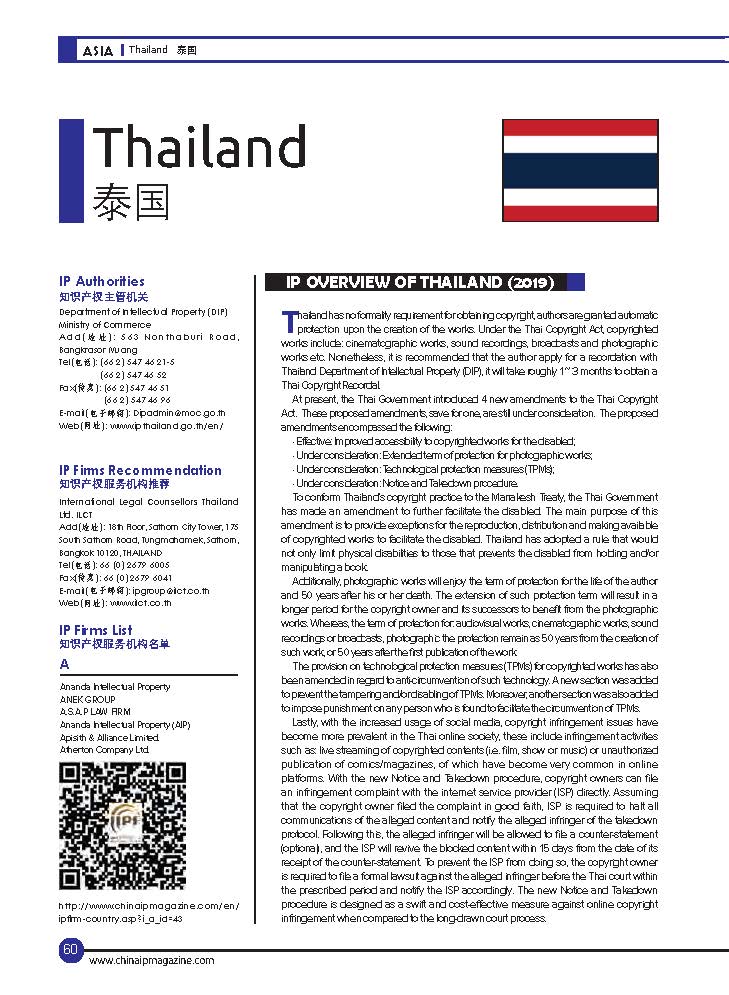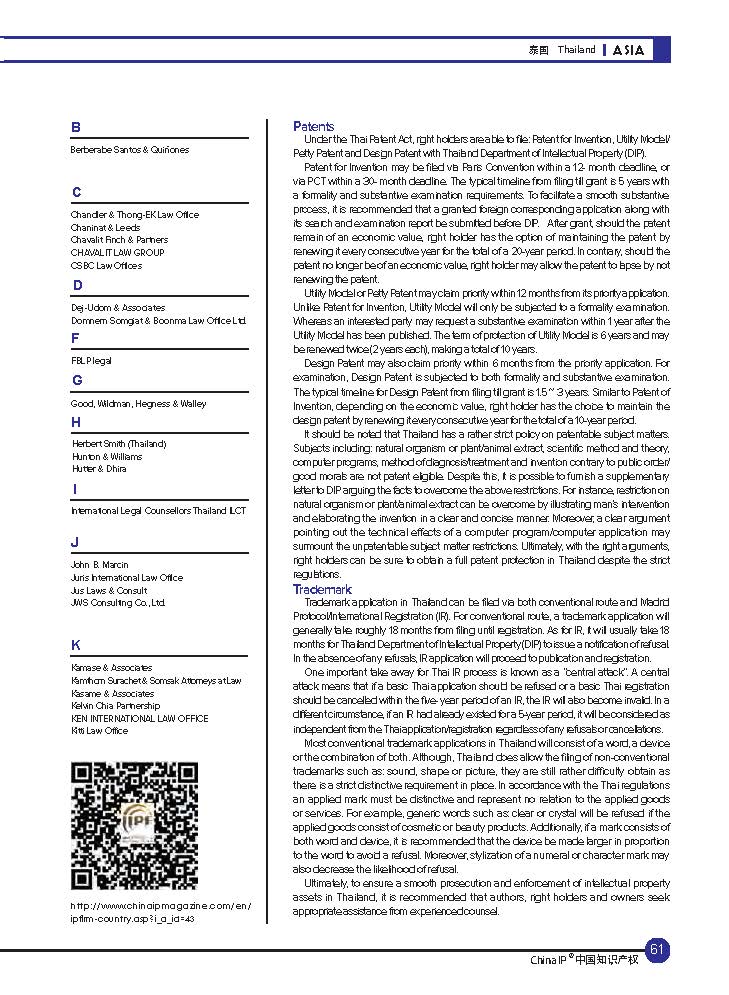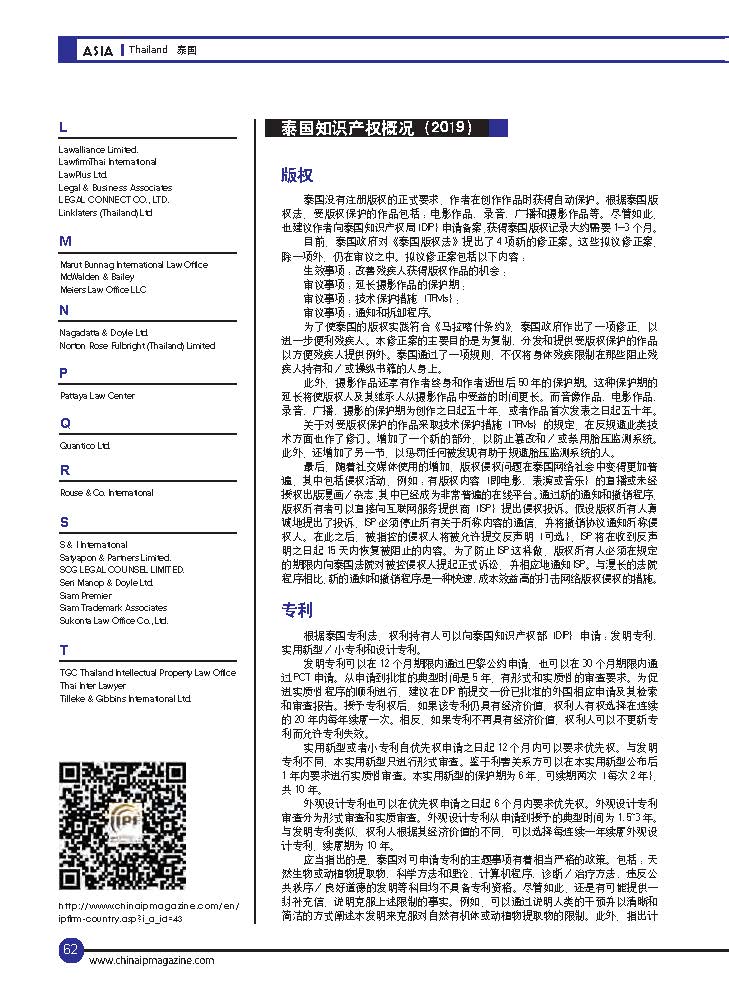ILCT endorsed as Thailand’s recommended IP firm by China IP Magazine
ILCT has been endorsed as Thailand’s recommended IP firm by China IP Magazine featuring an article on “Overview of Thailand’s IP System”.




ILCT has been endorsed as Thailand’s recommended IP firm by China IP Magazine featuring an article on “Overview of Thailand’s IP System”.




As Covid-19 (“Coronavirus”) continues rampage through the country, Thailand Department of Intellectual Property (“DIP”) will be allowing applicant/owner to file a request for a grace period extending the usual deadline. This grace period is preliminary provided for those who is directly affected by Covid-19. Further explanations are below.
What does this Covid-19 grace period cover?
Everything that is under the administration of DIP, including: patents, petty patents, design patents, trademarks, geographical indications and topography of integrated circuits.
This grace period will apply to all IP related prosecution process, such as: application deadline, opposition deadline, registration deadline, office action deadline or any payment deadline.
Who can apply for this?
The owner/applicant.
How does this work?
For individual, he/she must submit relevant documents showing evidence of sickness and treatment of Covid-19. In short, documents showing that Covid-19 has directly affected the ability to handle IP prosecution.
For company, it must prove that Covid-19 has directly impact and hinder the handling process of the related IP prosecution process. If the CEO or director became ill from Covid-19, he/she can submit related medical document on behalf of the company.
It is uncertain whether agent/lawyer can make a similar claim. At this time, it would seem that DIP will only allow a request made directly by the applicant/owner.
What are the required documents?
It is unclear as to how the Thai examiner/registrar will review these documents. Nonetheless, we have marked the important documents that should be submitted, and we will further discuss with the examiner/registrar if this is the case.
What happen after I submit the documents?
Once submitted, the examiner/registrar will review the request on a case-by-case basis. If approved, the applicant/owner will be granted a 30 days extension from the approval date. On the other hand, if the request is rejected, the applicant/owner can file an appeal within 15 days from the decision date. Once again, it is uncertain as to how DIP will calculate the dates.
Our recommendation
Avoid applying for a Covid-19 grace period unless it is necessary. Seeing multiple uncertainties, including document criteria, deadline on top of examiner/registrar own discretion, it may not be beneficial for owner/applicant to use this. There are considerable risks involve, if the request should fail it may subsequently cause the related IP matter to lapse.
Overall, we recommend that applicant/owner/agent maintain the formal deadline and prepare ahead of time. Our firm has implemented a work-from-home protocol and we are ready to assist you. If you have further question or concern, please contact ipgroup@ilct.co.th.
By:
Chart Chotiphol
Counsel/Business Development
Copyright
Thailand has no formality requirement for obtaining copyright, authors are granted automatic protection upon the creation of the works. Under the Thai Copyright Act, copyrighted works include: cinematographic works, sound recordings, broadcasts and photographic works etc. Nonetheless, it is recommended that the author apply for a recordation with Thailand Department of Intellectual Property (DIP), it will take roughly 1 ~ 3 months to obtain a Thai Copyright Recordal.
At present, the Thai Government introduced 4 new amendments to the Thai Copyright Act. These proposed amendments, save for one, are still under consideration. The proposed amendments encompassed the following:
To conform Thailand’s copyright practice to the Marrakesh Treaty, the Thai Government has made an amendment to further facilitate the disabled. The main purpose of this amendment is to provide exceptions for the reproduction, distribution and making available of copyrighted works to facilitate the disabled. Thailand has adopted a rule that would not only limit physical disabilities to those that prevents the disabled from holding and/or manipulating a book.
Additionally, photographic works will enjoy the term of protection for the life of the author and 50 years after his or her death. The extension of such protection term will result in a longer period for the copyright owner and its successors to benefit from the photographic works. Whereas, the term of protection for: audiovisual works, cinematographic works, sound recordings or broadcasts, photographic the protection remain as 50 years from the creation of such work, or 50 years after the first publication of the work.
The provision on technological protection measures (TPMs) for copyrighted works has also been amended in regard to anti-circumvention of such technology. A new section was added to prevent the tampering and/or disabling of TPMs. Moreover, another section was also added to impose punishment on any person who is found to facilitate the circumvention of TPMs.
Lastly, with the increased usage of social media, copyright infringement issues have become more prevalent in the Thai online society, these include infringement activities such as: live streaming of copyrighted contents (i.e. film, show or music) or unauthorized publication of comics/magazines, of which have become very common in online platforms. With the new Notice and Takedown procedure, copyright owners can file an infringement complaint with the internet service provider (ISP) directly. Assuming that the copyright owner filed the complaint in good faith, ISP is required to halt all communications of the alleged content and notify the alleged infringer of the takedown protocol. Following this, the alleged infringer will be allowed to file a counter-statement (optional), and the ISP will revive the blocked content within 15 days from the date of its receipt of the counter-statement. To prevent the ISP from doing so, the copyright owner is required to file a formal lawsuit against the alleged infringer before the Thai court within the prescribed period and notify the ISP accordingly. The new Notice and Takedown procedure is designed as a swift and cost-effective measure against online copyright infringement when compared to the long-drawn court process.
Patents
Under the Thai Patent Act, right holders are able to file: Patent for Invention, Utility Model/Petty Patent and Design Patent with Thailand Department of Intellectual Property (DIP).
Patent for Invention may be filed via Paris Convention within a 12- month deadline, or via PCT within a 30- month deadline. The typical timeline from filing till grant is 5 years with a formality and substantive examination requirements. To facilitate a smooth substantive process, it is recommended that a granted foreign corresponding application along with its search and examination report be submitted before DIP. After grant, should the patent remain of an economic value, right holder has the option of maintaining the patent by renewing it every consecutive year for the total of a 20-year period. In contrary, should the patent no longer be of an economic value, right holder may allow the patent to lapse by not renewing the patent.
Utility Model or Petty Patent may claim priority within 12 months from its priority application. Unlike Patent for Invention, Utility Model will only be subjected to a formality examination. Whereas an interested party may request a substantive examination within 1 year after the Utility Model has been published. The term of protection of Utility Model is 6 years and may be renewed twice (2 years each), making a total of 10 years.
Design Patent may also claim priority within 6 months from the priority application. For examination, Design Patent is subjected to both formality and substantive examination. The typical timeline for Design Patent from filing till grant is 1.5 ~ 3 years. Similar to Patent of Invention, depending on the economic value, right holder has the choice to maintain the design patent by renewing it every consecutive year for the total of a 10-year period.
It should be noted that Thailand has a rather strict policy on patentable subject matters. Subjects including: natural organism or plant/animal extract, scientific method and theory, computer programs, method of diagnosis/treatment and invention contrary to public order/good morals are not patent eligible. Despite this, it is possible to furnish a supplementary letter to DIP arguing the facts to overcome the above restrictions. For instance, restriction on natural organism or plant/animal extract can be overcome by illustrating man’s intervention and elaborating the invention in a clear and concise manner. Moreover, a clear argument pointing out the technical effects of a computer program/computer application may surmount the unpatentable subject matter restrictions. Ultimately, with the right arguments, right holders can be sure to obtain a full patent protection in Thailand despite the strict regulations.
Trademark
Trademark application in Thailand can be filed via both conventional route and Madrid Protocol/International Registration (IR). For conventional route, a trademark application will generally take roughly 18 months from filing until registration. As for IR, it will usually take 18 months for Thailand Department of Intellectual Property (DIP) to issue a notification of refusal. In the absence of any refusals, IR application will proceed to publication and registration.
One important take away for Thai IR process is known as a “central attack”. A central attack means that if a basic Thai application should be refused or a basic Thai registration should be cancelled within the five- year period of an IR, the IR will also become invalid. In a different circumstance, if an IR had already existed for a 5-year period, it will be considered as independent from the Thai application/registration regardless of any refusals or cancellations.
Most conventional trademark applications in Thailand will consist of a word, a device or the combination of both. Although, Thailand does allow the filing of non-conventional trademarks such as: sound, shape or picture, they are still rather difficulty obtain as there is a strict distinctive requirement in place. In accordance with the Thai regulations an applied mark must be distinctive and represent no relation to the applied goods or services. For example, generic words such as: clear or crystal will be refused if the applied goods consist of cosmetic or beauty products. Additionally, if a mark consists of both word and device, it is recommended that the device be made larger in proportion to the word to avoid a refusal. Moreover, stylization of a numeral or character mark may also decrease the likelihood of refusal.
Ultimately, to ensure a smooth prosecution and enforcement of intellectual property assets in Thailand, it is recommended that authors, right holders and owners seek appropriate assistance from experienced counsel.
By:
Chart Chotiphol
Counsel/Business Development